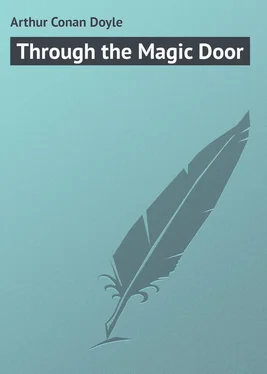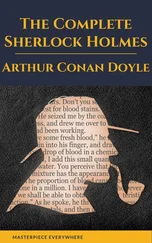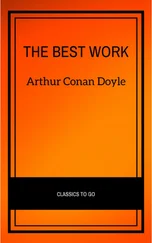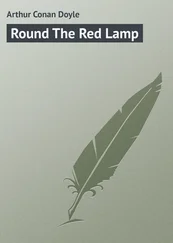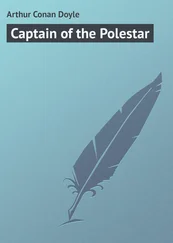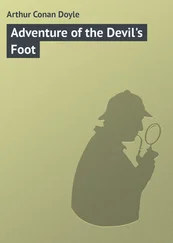Arthur Conan Doyle - Through the Magic Door
Здесь есть возможность читать онлайн «Arthur Conan Doyle - Through the Magic Door» — ознакомительный отрывок электронной книги совершенно бесплатно, а после прочтения отрывка купить полную версию. В некоторых случаях можно слушать аудио, скачать через торрент в формате fb2 и присутствует краткое содержание. Жанр: foreign_prose, на английском языке. Описание произведения, (предисловие) а так же отзывы посетителей доступны на портале библиотеки ЛибКат.
- Название:Through the Magic Door
- Автор:
- Жанр:
- Год:неизвестен
- ISBN:нет данных
- Рейтинг книги:3 / 5. Голосов: 1
-
Избранное:Добавить в избранное
- Отзывы:
-
Ваша оценка:
- 60
- 1
- 2
- 3
- 4
- 5
Through the Magic Door: краткое содержание, описание и аннотация
Предлагаем к чтению аннотацию, описание, краткое содержание или предисловие (зависит от того, что написал сам автор книги «Through the Magic Door»). Если вы не нашли необходимую информацию о книге — напишите в комментариях, мы постараемся отыскать её.
Through the Magic Door — читать онлайн ознакомительный отрывок
Ниже представлен текст книги, разбитый по страницам. Система сохранения места последней прочитанной страницы, позволяет с удобством читать онлайн бесплатно книгу «Through the Magic Door», без необходимости каждый раз заново искать на чём Вы остановились. Поставьте закладку, и сможете в любой момент перейти на страницу, на которой закончили чтение.
Интервал:
Закладка:
"One more charge and then be dumb, When the forts of Folly fall, May the victors when they come Find my body near the wall."
Not a bad verse that for one's life aspiration.
This is one of the things which human society has not yet understood – the value of a noble, inspiriting text. When it does we shall meet them everywhere engraved on appropriate places, and our progress through the streets will be brightened and ennobled by one continual series of beautiful mental impulses and images, reflected into our souls from the printed thoughts which meet our eyes. To think that we should walk with empty, listless minds while all this splendid material is running to waste. I do not mean mere Scriptural texts, for they do not bear the same meaning to all, though what human creature can fail to be spurred onwards by "Work while it is day, for the night cometh when no man can work." But I mean those beautiful thoughts – who can say that they are uninspired thoughts? – which may be gathered from a hundred authors to match a hundred uses. A fine thought in fine language is a most precious jewel, and should not be hid away, but be exposed for use and ornament. To take the nearest example, there is a horse-trough across the road from my house, a plain stone trough, and no man could pass it with any feelings save vague discontent at its ugliness. But suppose that on its front slab you print the verse of Coleridge –
"He prayeth best who loveth best All things, both great and small For the dear Lord who fashioned him He knows and loveth all."
I fear I may misquote, for I have not "The Ancient Mariner" at my elbow, but even as it stands does it not elevate the horse-trough? We all do this, I suppose, in a small way for ourselves. There are few men who have not some chosen quotations printed on their study mantelpieces, or, better still, in their hearts. Carlyle's transcription of "Rest! Rest! Shall I not have all Eternity to rest in!" is a pretty good spur to a weary man. But what we need is a more general application of the same thing for public and not for private use, until people understand that a graven thought is as beautiful an ornament as any graven image, striking through the eye right deep down into the soul.
However, all this has nothing to do with Macaulay's glorious lays, save that when you want some flowers of manliness and patriotism you can pluck quite a bouquet out of those. I had the good fortune to learn the Lay of Horatius off by heart when I was a child, and it stamped itself on my plastic mind, so that even now I can reel off almost the whole of it. Goldsmith said that in conversation he was like the man who had a thousand pounds in the bank, but could not compete with the man who had an actual sixpence in his pocket. So the ballad that you bear in your mind outweighs the whole bookshelf which waits for reference. But I want you now to move your eye a little farther down the shelf to the line of olive-green volumes. That is my edition of Scott. But surely I must give you a little breathing space before I venture upon them.
II
It is a great thing to start life with a small number of really good books which are your very own. You may not appreciate them at first. You may pine for your novel of crude and unadulterated adventure. You may, and will, give it the preference when you can. But the dull days come, and the rainy days come, and always you are driven to fill up the chinks of your reading with the worthy books which wait so patiently for your notice. And then suddenly, on a day which marks an epoch in your life, you understand the difference. You see, like a flash, how the one stands for nothing, and the other for literature. From that day onwards you may return to your crudities, but at least you do so with some standard of comparison in your mind. You can never be the same as you were before. Then gradually the good thing becomes more dear to you; it builds itself up with your growing mind; it becomes a part of your better self, and so, at last, you can look, as I do now, at the old covers and love them for all that they have meant in the past. Yes, it was the olive-green line of Scott's novels which started me on to rhapsody. They were the first books I ever owned – long, long before I could appreciate or even understand them. But at last I realized what a treasure they were. In my boyhood I read them by surreptitious candle-ends in the dead of the night, when the sense of crime added a new zest to the story. Perhaps you have observed that my "Ivanhoe" is of a different edition from the others. The first copy was left in the grass by the side of a stream, fell into the water, and was eventually picked up three days later, swollen and decomposed, upon a mud-bank. I think I may say, however, that I had worn it out before I lost it. Indeed, it was perhaps as well that it was some years before it was replaced, for my instinct was always to read it again instead of breaking fresh ground.
I remember the late James Payn telling the anecdote that he and two literary friends agreed to write down what scene in fiction they thought the most dramatic, and that on examining the papers it was found that all three had chosen the same. It was the moment when the unknown knight, at Ashby-de-la-Zouch, riding past the pavilions of the lesser men, strikes with the sharp end of his lance, in a challenge to mortal combat, the shield of the formidable Templar. It was, indeed, a splendid moment! What matter that no Templar was allowed by the rules of his Order to take part in so secular and frivolous an affair as a tournament? It is the privilege of great masters to make things so, and it is a churlish thing to gainsay it. Was it not Wendell Holmes who described the prosaic man, who enters a drawing-room with a couple of facts, like ill-conditioned bull-dogs at his heels, ready to let them loose on any play of fancy? The great writer can never go wrong. If Shakespeare gives a sea-coast to Bohemia, or if Victor Hugo calls an English prize-fighter Mr. Jim-John-Jack – well, it was so, and that's an end of it. "There is no second line of rails at that point," said an editor to a minor author. "I make a second line," said the author; and he was within his rights, if he can carry his readers' conviction with him.
But this is a digression from "Ivanhoe." What a book it is! The second greatest historical novel in our language, I think. Every successive reading has deepened my admiration for it. Scott's soldiers are always as good as his women (with exceptions) are weak; but here, while the soldiers are at their very best, the romantic figure of Rebecca redeems the female side of the story from the usual commonplace routine. Scott drew manly men because he was a manly man himself, and found the task a sympathetic one.
He drew young heroines because a convention demanded it, which he had never the hardihood to break. It is only when we get him for a dozen chapters on end with a minimum of petticoat – in the long stretch, for example, from the beginning of the Tournament to the end of the Friar Tuck incident – that we realize the height of continued romantic narrative to which he could attain. I don't think in the whole range of our literature we have a finer sustained flight than that.
There is, I admit, an intolerable amount of redundant verbiage in Scott's novels. Those endless and unnecessary introductions make the shell very thick before you come to the oyster. They are often admirable in themselves, learned, witty, picturesque, but with no relation or proportion to the story which they are supposed to introduce. Like so much of our English fiction, they are very good matter in a very bad place. Digression and want of method and order are traditional national sins. Fancy introducing an essay on how to live on nothing a year as Thackeray did in "Vanity Fair," or sandwiching in a ghost story as Dickens has dared to do. As well might a dramatic author rush up to the footlights and begin telling anecdotes while his play was suspending its action and his characters waiting wearily behind him. It is all wrong, though every great name can be quoted in support of it. Our sense of form is lamentably lacking, and Sir Walter sinned with the rest. But get past all that to a crisis in the real story, and who finds the terse phrase, the short fire-word, so surely as he? Do you remember when the reckless Sergeant of Dragoons stands at last before the grim Puritan, upon whose head a price has been set: "A thousand marks or a bed of heather!" says he, as he draws. The Puritan draws also: "The Sword of the Lord and of Gideon!" says he. No verbiage there! But the very spirit of either man and of either party, in the few stern words, which haunt your mind. "Bows and Bills!" cry the Saxon Varangians, as the Moslem horse charges home. You feel it is just what they must have cried. Even more terse and businesslike was the actual battle-cry of the fathers of the same men on that long-drawn day when they fought under the "Red Dragon of Wessex" on the low ridge at Hastings. "Out! Out!" they roared, as the Norman chivalry broke upon them. Terse, strong, prosaic – the very genius of the race was in the cry.
Читать дальшеИнтервал:
Закладка:
Похожие книги на «Through the Magic Door»
Представляем Вашему вниманию похожие книги на «Through the Magic Door» списком для выбора. Мы отобрали схожую по названию и смыслу литературу в надежде предоставить читателям больше вариантов отыскать новые, интересные, ещё непрочитанные произведения.
Обсуждение, отзывы о книге «Through the Magic Door» и просто собственные мнения читателей. Оставьте ваши комментарии, напишите, что Вы думаете о произведении, его смысле или главных героях. Укажите что конкретно понравилось, а что нет, и почему Вы так считаете.
